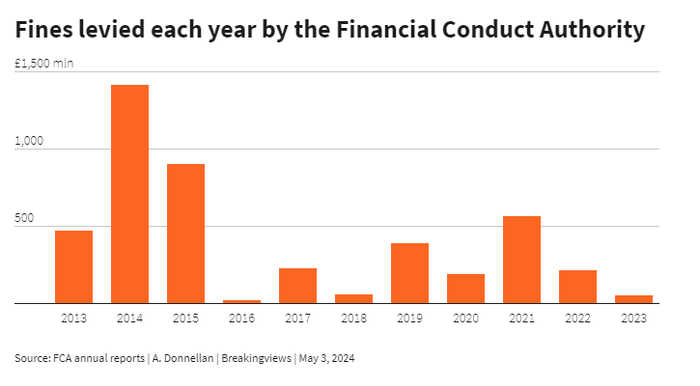Published 16:12 IST, May 3rd 2024
UK watchdog name-and-shame plan is worth the risk
Britain’s Financial Conduct Authority said in an April 25 letter that it was pressing ahead with plans to announce details of investigations much earlier.
- Republic Business
- 3 min read

Sharper stick. City grandees are used to gentle treatment from Britain’s markets watchdog, and they want to keep things as they are. Lawyers, bankers and finance minister Jeremy Hunt asked the Financial Conduct Authority to reconsider plans to “name and shame” companies under investigation. But the controversial changes are worth pursuing.
Currently, the FCA generally only discloses the identities of firms in the spotlight when it has enough evidence to sanction them. One consequence of this, the watchdog reckons, is that companies have little reason to cooperate: if they stonewall the regulator, maybe the investigators will find nothing and go away. FCA boss Nikhil Rathi wants to change that by giving enforcers the power to name companies at an earlier stage. It could entice whistleblowers, while the mere threat of disclosure could act as an incentive to get stubborn companies to open up.
The idea has gone down like a lead balloon with trade bodies, lawyers and investor groups. They fear that the change will create a “guilty until proven innocent” mindset and encourage regulators to go on fishing expeditions. Hunt worries that it will undermine the UK’s competitiveness. In a worst-case scenario, Rathi’s enforcers could announce a probe into an innocent bank, prompting customers to flee rather than wait for the final outcome.
The fears are overblown. First, the FCA’s dismal investigative track record suggests it needs sharper teeth. Take its investigation into former stock-picker Neil Woodford, whose fund collapsed in 2019 after failing to meet investor redemptions. In June of that year, the FCA opened a probe, which is still ongoing. The watchdog on average takes almost three and a half years to complete an investigation.
Second, worries about a newly empowered FCA running amok are implausible. The slow progress of its existing investigations suggests the watchdog hardly has the resources for frivolous fishing expeditions. And by nature, it’s a technocratic and independent body that’s funded by fees charged to regulated firms. That’s sharply different to the U.S. Securities and Exchange Commission, whose chairman is appointed by the president and typically has a more political agenda.
Lastly, it’s not clear that companies sustain huge damage in reaction to FCA probes. The watchdog says that five firms have independently chosen to reveal an enforcement investigation since 2021. Only in one of those instances did the company’s share price decline by more than 1%.
Hunt and other City defenders want to protect sound companies from regulatory interference. But that danger is not as real as they think. It’s more likely that having a speedier watchdog would bolster Britain’s credentials rather than harm them.

Context News
Britain’s Financial Conduct Authority said in an April 25 letter that it was pressing ahead with plans to announce details of investigations much earlier, including disclosing the identity of the firms it is probing. Currently, the UK financial watchdog only names companies once it has completed an investigation. The FCA said it wants UK markets to sustain their competitiveness and grow their reputation for fair play, cleanliness and integrity. Effective regulation is a key foundation for that reputation, the watchdog said.
Updated 16:12 IST, May 3rd 2024